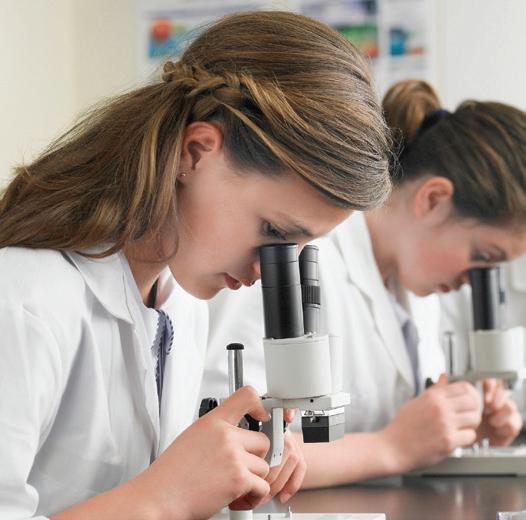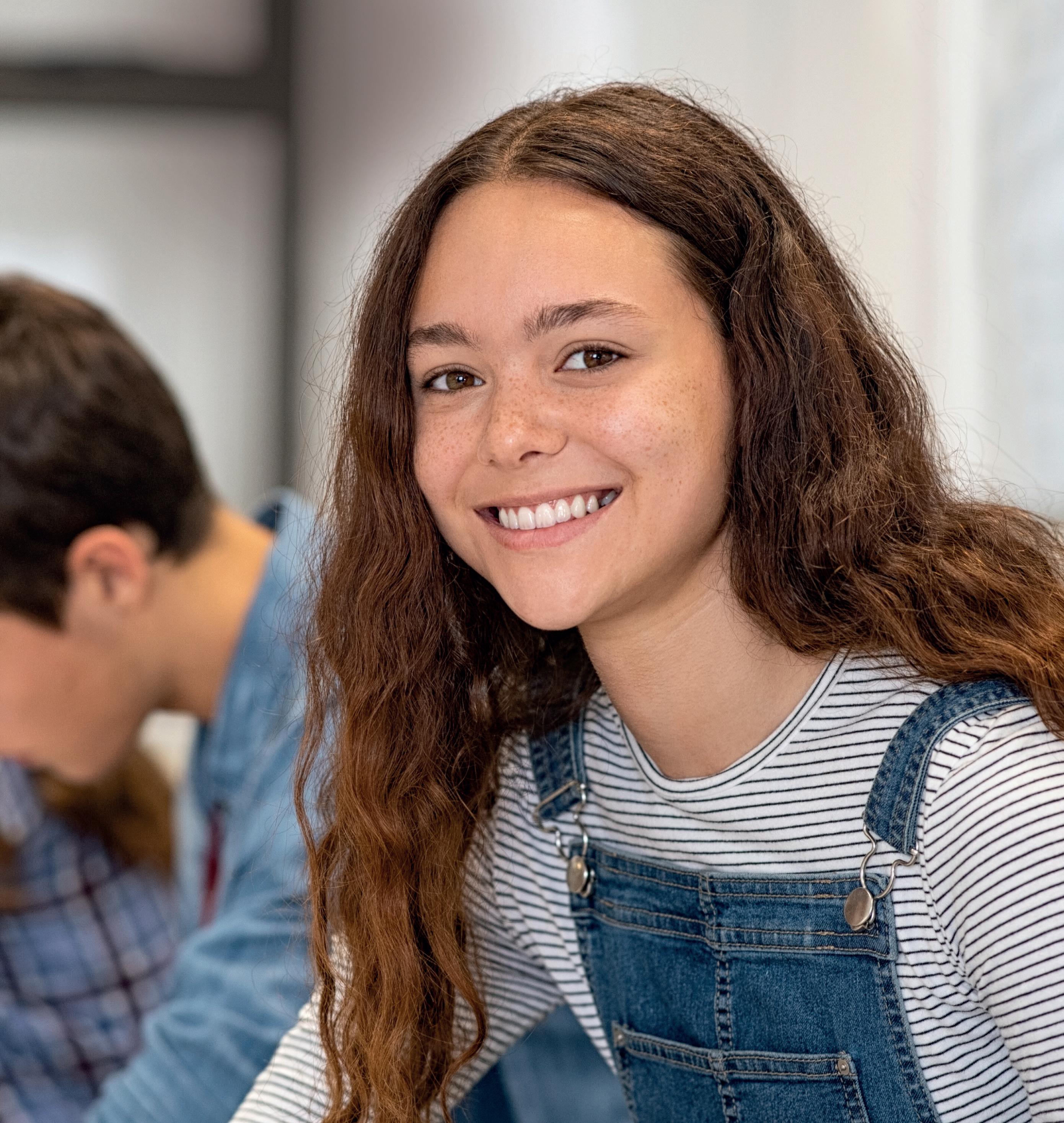

Welcome to Years 10-11
Years 10 and 11 are part of a two-year exam cycle that culminates in the (International) General Certificate of Secondary Education (I)GCSEs. These are British public examinations that provide a solid foundation in a wide range of subjects and prepare students for more advanced study in Years 12 and 13.
We have high academic standards despite being a non-selective school. Our students consistently achieve excellent results.
What does Secondary School look like?
Years 7-9 11-14
Years 10-11 14-16
Years 12-13 16-18
A broad curriculum
Exam years
• (I)GCSEs: (International) General Certificate of Secondary Education
• BTEC Level 2 in Business also available as an option
Pre-university exam years
• BTEC Extended Diploma Level 3
• A Level
• International Baccalaureate (IB) Diploma
New students at BSB are placed into the correct year group for their age. Please consult the chart to determine which year group your child is eligible to enter, according to their date of birth.
Year group Date of birth
Year 10 1 September 2010 - 31 August 2011
Year 11 1 September 2009 - 31 August 2010
• Solid foundation in a wide range of subjects
• Two-year programme
• Exams at the end of Year 11
• 6 core subjects and 4 option choices
• BTEC is vocational and is continually assessed
• Two-year programmes
• BTEC Extended Diploma Level 3 is continuous assessment (no exams)
• A Level and IB have final exams
• 3 subjects for A Level
• 6 subjects for IB
• Entry criteria apply
The Curriculum
The Year 10 and 11 curriculum is based on the UK National Curriculum. Most students take six core subjects and four optional subjects at (I)GCSE and one BTEC, resulting in a total of nine or ten examinations at the end of Year 11.
(I)GCSEs are graded in numbers from 9-1, 9 being the top grade and 4 being a satisfactory standard.
Compulsory subjects
Option subjects
Art & Design
BTEC Business
Computer Science
Design Technology: Resistant Materials
Design Technology: Textiles
Drama
Dutch (1st and 2nd language)
English as an Additional Language
Food & Nutrition
Geography
German
History
Learning support
Music
Physical Education
Spanish
*Please note that not all combinations of subjects are possible. Final option blocks are confirmed towards the end of the Spring Term. Students are asked to select six option subjects, indicating the four preferred subjects and two reserves.
English as an Additional Language (EAL)
Throughout Year 10 and 11, the primary aim in EAL is to ensure that all students are taught the necessary language to meet the academic demands of their mainstream classes. In addition, students are prepared for the Cambridge IGCSE in English as a Second Language (CEFR B2 Level).
Learning Support
Learning Support may be offered to replace one (I)GCSE option for students who require additional support (academically, socially, emotionally). This choice is made in collaboration with students, teachers, parents and sometimes external agencies. Learning Support is taught in small groups to provide individual attention, support and feedback to students. The focus is on the development of organisation, time management, exam technique, motivation, and study skills with the goal of creating independent and curious learners who achieve individual success.
Supervised Study
Where students have a demanding workload, including high level Enrichment participation, we provide Supervised Study as an option. This gives students one less (I)GCSE. The Supervised Study class is supported by a qualified teacher from a range of subjects.
Equipment provided (included in fees)
• Personal locker
• Basic sports kit
• Textbooks
Homework
A timetable is given for each Year group
Year 10
Year 11
• Each subject will give students one homework task per week
• It is expected that students should spend around 40 minutes on each homework task
• Each subject will give students one homework task per week
• It is expected that students should spend around 50 minutes on each homework task
Please note that the above is a guideline. The actual length of time needed to complete a piece of homework will often depend on the academic aptitude and diligence of a student. If parents feel their child is choosing to spend too much or too little time on homework, they are encouraged to raise this at the Progress Meetings with teachers.
Assessments and reporting
• Settling in report during September (Year 10 only)
• Interim Report during Autumn Term
• Interim Report for Year 10 and Annual Report in Year 11 during the Spring Term
• Annual Report for Year 10 in the Summer Term
In Year 10, there are three reporting sessions. In Year 11 there are two reporting sessions - one in the Autumn Term and one in the Summer Term.
Enrichment and Trips
As you would imagine from an international school, our Enrichment activities are extensive and our facilities are superb. There are over 100 sports/arts/technology activities available out of school hours. A variety of curriculum and Enrichment trips take place throughout the year.
Year 11 Pre BTEC, A Level and IB Course
This is a one year course, ideally for students of age 15, starting at BSB during the month of September. The purpose of the course is to equip students with the skills in various subject areas, ready to start a Post-16 programme.
All students will study the core (I)GCSE subjects of English Language, Mathematics and Science. Students will have the opportunity of obtaining 3 (I)GCSEs in these subjects the Summer Term.
Those students who have studied French previously, will also have the opportunity of taking (I)GCSE French exams.
In addition, students will follow a broad range of subjects covering the Humanities, the Arts and Technology. Although non-examined, these subjects will cover the essential skills required for Post-16 study.
(I)GCSE
Students study all three Sciences of Biology, Chemistry and Physics aiming for the (I)GCSE Single Award in
Students who have a previous background in French will have the opportunity to take 1st or 2nd language (I)GCSE exam. Other students will have supervised study time.
History These courses offer a flavour of content and skills from the (I)GCSE course, with the aim of developing transferable skills and knowledge to equip the students for BTEC, A Level or IB, through essential literacy skills (reading and writing), a process of identification, explanation and evaluation.
This course allows students to foster an interest in, an enjoyment of, and confidence in the use of computing. The candidates will develop their ability to code to a high level.
Year 11 Pre BTEC, A Level and IB Course (continued)
Music
Tutor/PSHE
A course which increases the student’s awareness of the world of designing and making a product. This will include practical skills which could lead to taking Design and Technology at A level.
Students will be developing a wide range of skills. Among them, students will develop a working knowledge of the materials, practices and technology of Art and Design.
This course provides students with an opportunity to compose their own music in a range of styles using 'cakewalk' software, as well as learning about some theoretical aspects of music.
The course is active and places great emphasis on ‘learning by doing’. Through a wide range of activities, students learn the skills that go into creating what we finally see on stage.
The overall aim of the PSHE course is to enable students to increase their awareness of themselves, other people, the local community and the larger society, national and international, to which they belong.
Students cover a diverse range of sports - including invasion games, swimming, fitness, gymnastics and ball and net games. The focus is on both character and physical development as we look to equip students with a life long passion for activity.
The subjects and time allocated can change from year to year.
Note: For Year 10 students currently studying (I)GCSEs in another school, transferring to BSB on a full set of (I)GCSEs is not usually possible. This is a fixed curriculum. This means it will not be possible for students to study additional or alternative (I)GCSEs. This is due to:
• Different exam boards
• Different order of teaching
• Timetable constraints do not allow for the same subjects to be studied
Therefore it will only be possible to study the above course if a student is transferring at the age of 15. Subject
How are each of the Post16 pathways recognised by Higher Education institutions?
This section is included for information only.
New students to Year 11 should note that, if you go on to study A Levels, then it may not be possible to apply to some Dutch and Irish universities, as some require at least six different subjects at GCSE or A Level.
An International Baccalaureate (IB) Diploma is recognised globally as a university entrance qualification
This is sometimes dependent on the subjects chosen for the Diploma. In some cases, specific grades are required.
To study Economics at Tilburg, the Diploma must include Standard Level AA Maths (or higher).
To study Economics at LSE stipulates 38 points in total, with grades of 7, 6 & 6 at Higher Level (including a 7 in HL Maths).
Students considering entry in German or Swiss universities in particular should check carefully which IB subjects and levels are required.
A Levels are also globally recognised as a university entrance qualification
Most universities require three A Levels; some just two. The subjects/grades of the A Levels can have a bearing on whether or not an offer is made.
The Faculty of Science at McGill requires grades of A, A, A (must be in Maths and at least one science)
Most Dutch research unis consider grades of C,C,C as equivalent to an IB Diploma. However, some universities will not accept ‘non-academic’ subjects like Media or Art or DT .
For 4-year courses at Dutch Universities of Applied Science, two E grades are sufficient
Communication Studies at Concordia (in Montreal) requires a C and a D grade
• Most Dutch universities require six different subjects in total. This usually means A Levels & GCSEs (grade C/4 or above).
• Ireland expects A Level students to have also completed GCSE exams, as does Switzerland.
Entry requirements for German, Swiss and Swedish universities must be checked carefully, including whether A Level results issued in August can be processed by the university in time to begin the course in September.
Example 1
Example 2
Example 3
Example 4
Example 1
Example 2
The BTEC Extended Diploma is less widely accepted around the world
Most universities in the UK, including some highly selective ones, will treat it as the equivalent of three A Levels or the IB Diploma.
Universities of Applied Science in Belgium and the Netherlands accept the BTEC Extended Diploma, but research universities do not.
Some other European universities accept BTEC Extended Diploma as equivalent to IB/A Level. For example IE University in Madrid accepts the BTEC Extended Diploma.
BTEC is not accepted in Germany.
As with A Levels, universities can ask for specific grades and/or specific subjects.
Business Management at the University of Surrey requires grades of D, D, D (D = Distinction).
The BTEC/A Level combination works well for UK universities
Many UK universities total the ‘UCAS Points’ from different qualifications, instead of simply asking for A Level grades/IB score. For example, Merit or a C grade = 32 Points; Distinction or A grade = 48. (EPQ carries half the points of A Levels).
Criminology at Northumbria requires 120 UCAS Points. Some non-UK universities also accept a split qualification. Business at Odisee in Brussels.
If there are two A Levels in the combination, this works fine with universities needing two A Levels (at grade E or above). An example of this is universities of applied sciences in the Netherlands. In these cases, most will also stipulate 4 GCSEs in different subjects at grade C/4 or above.
BTECs other than Extended Diploma need to be checked on a case-by-case basis.
General Remarks
Any of the four pathways above give students access to a large number of universities. However, for those students with specific university destinations or courses in mind, specific research is key. Different universities in each country will have differing requirements for their courses. Fortunately, universities generally make their entry requirements easy to find.
What
resources do BSB students have access to as support to research and reflection?
Students at BSB benefit from excellent support with higher education decision-making. BSB uses tools such as the Unifrog platform to help students navigate the world of higher education. Students are also given the opportunity to generate a Morrisby Profile, to help them discover the options that will work well for them. The Higher Education and BSB Futures team meet students individually to help guide them in decisions about the future. In addition, a range of round-table discussions, talks and university fairs are routinely organised for students, exposing them to the myriad opportunities available and helping them make informed decisions.
Example 1
Example 1
Example 2
FAQs
How big are the classes?
If my child fails the year, do they need to repeat it?
Can I join either of these year groups at any time?
The usual working maximum class size is 21 and 16 for practical subjects. There may be occasions where we go over this size, but this is rare.
You cannot “fail” the year under the (I)GCSE system. A wide range of grades are available to students depending on their level of application and ability. Students who get lower than a grade 4 in Maths and English at (I)GCSE will be required to resit in Year 12 and 13 if they chose A Level or BTEC.
The (I)GCSE courses are two years in length. Therefore we only accept new students for the full programme at the beginning of Year 10. We understand that for some relocating families it is impossible to join at the beginning of the academic year. We are sometimes able to offer solutions such as joining Year 10 with a reduced number of exams. Please contact the Admissions Team to discuss this in more detail.
What is included in the fees?
Are any external tests used for assessing students during the course?
How many students are British and how many other nationalities are represented?
Why is there no school uniform?
Is there a school bus?
What is the difference between Double Award and Single Award Science?
Textbooks, enrichment clubs and activities, basic PE kit, calculator, and public examinations entrance. Students are required to have their own laptop. Ideally, this should be a laptop with a long battery life that is light to carry.
CAT and PASS tests are taken in collaboration with GL assessment which give information about students’ study skills and learning preferences. More information about these can be given on request.
Around 30% of students at the school are British. Approximately 70 nationalities are represented within our school community, making it one of the most diverse and inclusive student environments in any educational facility in the world.
School uniforms are not common in mainland Europe. However, BSB students are expected to respect a dress code and ensure their clothing is appropriate for the learning environment. There is a school PE (sports) kit which all students must wear for PE from Year 1 onwards.
Yes, we operate a supervised school bus service that covers many routes. Our Admissions Office will be happy to provide details.
All students at (I)GCSE level study Physics, Chemistry and Biology. In both the Double Award and the Single Award, students are assessed in all three sciences. The Double Awards equates to two (I)GCSEs, while the Single Award equates to one (I)GCSE.
Digital Literacy, Ethical use of AI and Online Safety in Secondary School
At BSB, we aim to strike a balance regarding the use of technology, taking into consideration:
• The general concern for overuse.
• The possible impact on mental health.
• The need to prepare students for the digital world we live in.
• The digital skills required in the future workplace.
Digital Literacy, Ethical use of AI and Online Safety are interwoven into school life at BSB.
MOBILE PHONES & LAPTOPS
• Students in Years 7-9 are expected to leave their mobile phones in their lockers during the school day. However, they can check messages at breaktimes and lunchtimes, if they wish.
• Students in Years 10-13 are allowed to keep their mobile phones on them but may only take them out in lessons with the teacher’s permission. Sometimes mobile phones may be used for learning activities within the lesson.
• The cafeteria is a mobile free zone for all students. In good weather BSB students are encouraged to be outside socialising with friends and playing sports during break and lunch. Our outside spaces and pitches tend to be a hive of physical activity when it’s not raining.
• Students should not be using laptops on school buses (sometimes an exception is made on the long distance buses for SHAPE and Antwerp for completion of homework)
• Students should not be installing VPNs onto school issued laptops, and gaming on school laptops during the school day is prohibited.
CURRICULUM INTEGRATION
• A general curriculum is followed e.g. screen time management, digital wellbeing, creating a positive online reputation, misinformation, risks of online gaming, building digital resilience, ethical use of AI, cyber bullying, online scams, online grooming, etc:
• In Years 7-9, as an integral part of their Computer Science and PSHE lessons.
• In Years 10-11, within the PSHE curriculum.
• Year 12 have an induction programme, where digital literacy, Academic Honesty and AI use are covered in line with the IB and UK Exam Board expectations.
• Occasional Year Group Assemblies may have a digital safety theme.
• Technology free breaks and lunchtimes led by our pastoral teams.
• All Exam subjects (Years 10-13) incorporate:
• Digital literacy (including ethical use of AI & Academic Honesty), relevant to the subject area.
• The IB and UK exam boards’ very strict guidelines regarding digital literacy, ethical use of AI and referencing.
• Students are shown the assessment criteria for Exam coursework. Note, often, very few marks are awarded for the end product, and most marks are awarded for the process. Often, this means that the overuse of AI will lead to lower marks, counting against the student.
• Awareness and appropriate use of online AI self-marking tools for internal exam assessed work.
• For students in Post-16, this is also reinforced in the Extended Project Qualification (EPQ) and the IB Diploma Core (Extended Essay and Theory of Knowledge assignments)
• Interwoven into the subject curriculum, in all year groups, is the appropriate use of AI. Here are some examples:
• How to reference sources, including AI, in humanities lessons.
• In the English and Media Faculty: How AI could be used to produce creative writing, such as poetry, then to discuss the limitations of AI and how the product could be improved upon. Also, the use of AI to produce practical media work using terminology to manipulate the image.
• Awareness and appropriate use of AI in theoretical research, but how this cannot replace practical creativity as Art, Design and Technology promotes students own creative thoughts and not rehashing other pieces.
• Awareness and appropriate use of AI conversation tools and language translation software in Languages.
• Appropriate use of calculators, graph plotting software, algebraic manipulation software and AI
• (e.g. ChatGPT) in Mathematics when solving Maths problems.
• Awareness of AI Music composition software and Film editing software in the Arts.
POLICIES AND SUPPORT
• The school has an internet filter that aims to strictly limit access to inappropriate websites.
• Teachers have access to plagiarism detection software (Turn-It-In) as a tool to assess whether work has been plagiarised. This includes the possible use of AI by students.
• The school has several relevant policies:
• Our Academic Honesty Policy includes guidelines and expectations for students regarding internet referencing and ethical use of AI. This is available to all parents on My School Portal.
• The school has a Privacy Policy, including GDPR. This is available on the school website.
• All students read and sign an acceptable use policy for school laptops in Years 7-9 (If parents would like greater control over their child’s laptop than the school laptop allows e.g. installing monitoring software and time restriction software, it may be possible for parents to provide their own child’s Windows laptop with the same software and touch screen as the school devices. However, in these cases, the full maintenance and damages to the laptop would lie with the parents, as we would be unable to do this within school.)
• The school works with a specialist external provider, who also acts as our data protection officer. This company offers user support and guidance on online safety and legal requirements.
• Digital Safety events are sometimes organised by FoBSB for parents (Families of BSB).
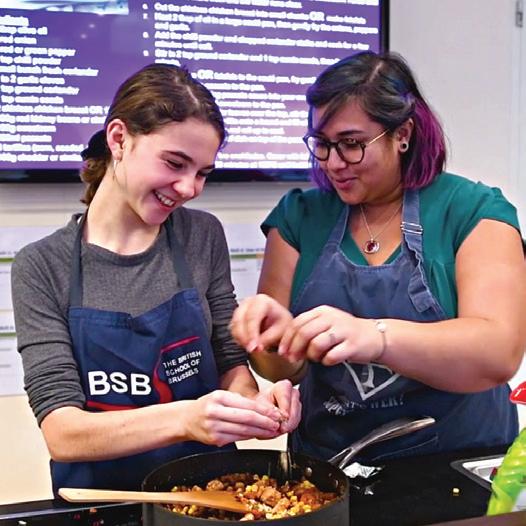
The school has taught, encouraged and shown our children to never limit their capabilities.
Qalo family
The teachers and resources are really impressive and we, as a whole family, feel lucky to be part of BSB.
Bielawska family
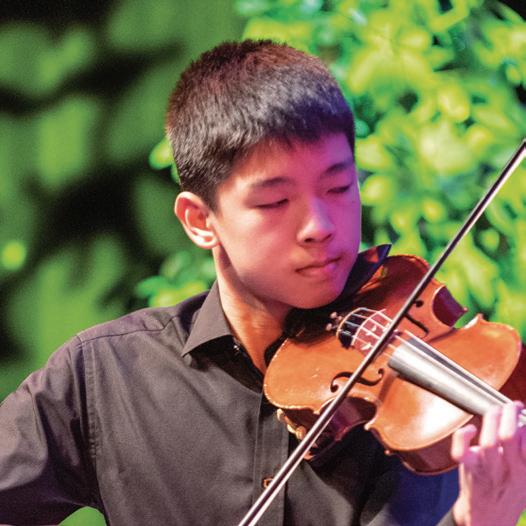
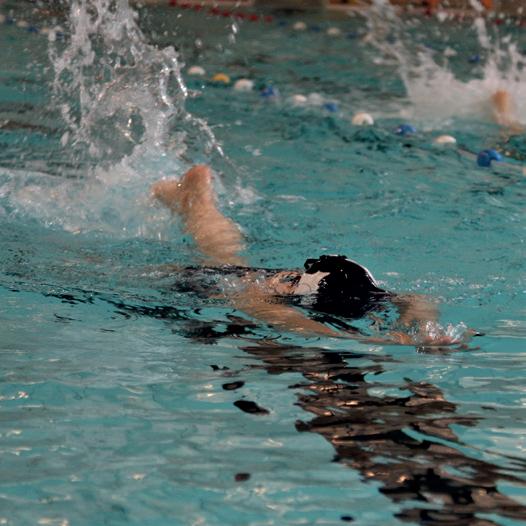
The culture of the school instils respect and self confidence in the students which in turn leads to an excellent learning experience.
Matthews family
The quality of teaching, the facilities and how much the teachers care for their students are unlike any other school.
Carvalho family
An international learning community
The British School of Brussels vzw Pater Dupierreuxlaan 1, 3080 Tervuren, Belgium
Tel: +32 (0)2 766 04 30 – Fax: +32 (0)2 767 80 70 www.britishschool.be
Email: admissions@britishschool.be
